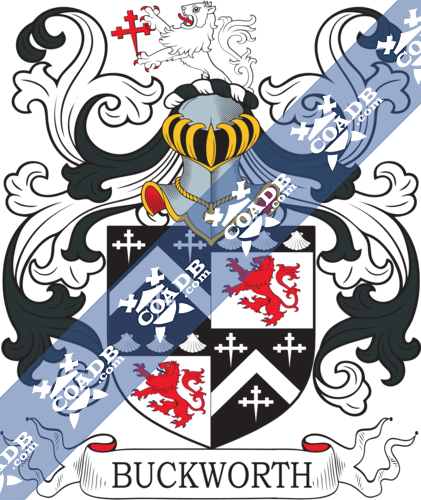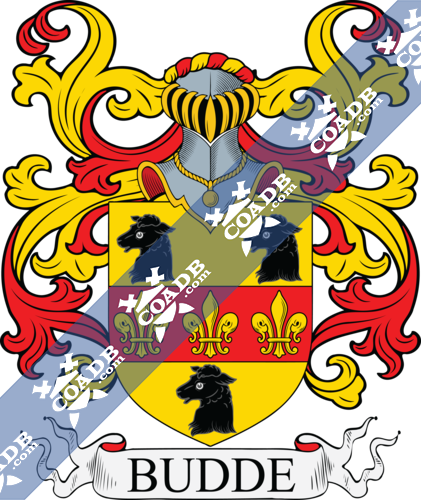Budd Family Crest, Coat of Arms and Name History

Budd Coat of Arms Gallery
Don’t know which Coat of Arms is yours?
We can do a genealogical research. Find out the exact history of your family!
Learn MoreOrigins of Budd:
This old and intriguing name is of Anglo-Saxon origin, and acquires from the Old English particular name or byname, “Budda”. There is some confusion about the original meaning of the name. It may reflect the use of the Old English pre 7th century “budde”, bud, swelling, as a nickname for a plump or thickset person, or it may also have used as a nickname for someone with some fancied similarity to a beetle, from the Old English “budda”, beetle. The first record, below, is strictly speaking that of a byname, and the entry represents the person as being “so called because of his thickness”. The personal name Budda shows in some English place names, such as Budbrooke, in Warwickshire, and Budworth in Cheshire, and has created a variety of derivative surnames, among them the diminutive form’s, Budcock, and the patronymics Budds and Budding. The wedding of one Bartholomew Budd and Mary Smyth noted at St. Andrew by the Wardrobe, in London, in February 1573.
Variations:
More common variations are: Buddo, Budde, Buddy, Budda, Buddi, Buddu, Buddh, Baudd, Boudd, Buidd.
England:
The surname Budd first appeared in Cornwall, where they held a family seat from very early times, some say before the Norman Invasion in 1066 AD. The very first recording spelling of the family was shown to be that of Brihtmerus Budde, dated 1025, in the Record of Old English By names. It was during the reign of King Cantue, dated 1016-1035. Surname all over the country became a necessity with the introduction of personal taxation. It came to be known as Poll Tax in England. Surnames all over the country began to develop with unique and shocking spelling varieties of the original one.
United States of America:
Some of the people with the name Budd who arrived in the United States in the 17th century included Joseph Budd, who arrived in Minnesota in 1632. John Budd, who landed in Massachusetts in 1633. Jo Budd, aged 15, arrived in Virginia in 1635. John Budd settled in Boston Massachusetts in 1637. Giles Budd settled in Virginia in 1639 People with the surname Budd who landed in the United States in the 18th century included Thomas Budd settled in Nevis in 1722. Nicolas Budd, who landed in Massachusetts in 1743. The following century saw much more Budd surnames arrive. Some of the people with the surname Budd who arrived in the United States in the 19th century included Catharine Budd, who landed in New York in 1824. Andrea Johan Budd, aged 30, arrived in Boston, Massachusetts in 1850. J R Budd, who landed in San Francisco, Cai in 1850. People with the surname Budd who landed in the United States in the 20th century included Sandov Budd, who landed in Alabama in 1928.
Canada:
Some of the people with the surname Budd who arrived in the Canada in the 18th century included Ezekial Budd, who arrived in Halifax, Nova Scotia in 1749-1752. Samuel Budd, who arrived in Nova Scotia in 1749. Ezekiel Budd, who arrived in Nova Scotia in 1749. Israel Budd, who arrived in Nova Scotia in 1750. Samuel Budd, who landed in Nova Scotia in 1750.
Australia:
Some of the individuals with the surname Budd who landed in Australia in the 19th century included George Budd, English prisoner from Surrey, who moved aboard the “Andromeda” in November 1832, settling in New South Wales, Australia. Eliza Budd arrived in Adelaide, Australia aboard the ship “Asia” in 1839. Harriet Budd, English criminal from Sussex, who moved aboard the “Angelina” in April 1844, settling in Van Diemen’s Land, Australia. Richard Budd, English convict from Gloucester, who moved aboard the “Agincourt” in July 1844, settling in Van Diemen’s Land, Australia. Robert Budd arrived in Adelaide, Australia aboard the ship “Mariner” in 1847.
Blazons & Genealogy Notes
Notes: (Willesley, co. Devon). Blazon: Azure a fesse dancette, in chief a bow bent in fesse, and three arrows, two in saltire and one in pale, tied with a ribbon in base, all or. Crest—A hurt charged with a star of seven points or.







